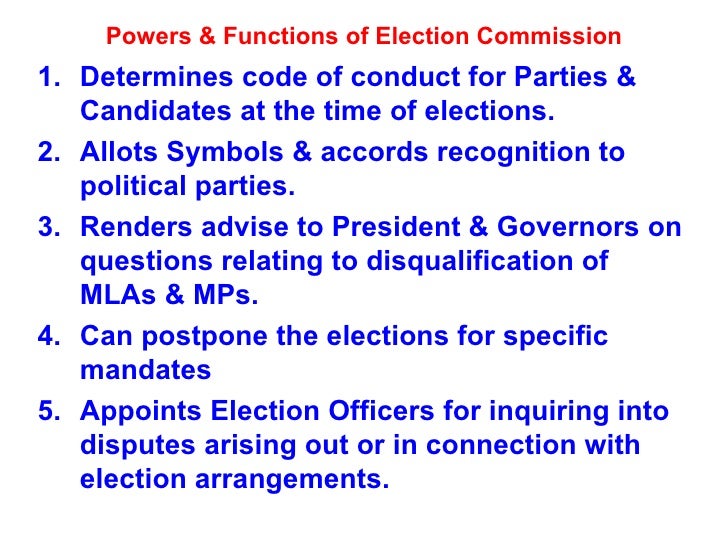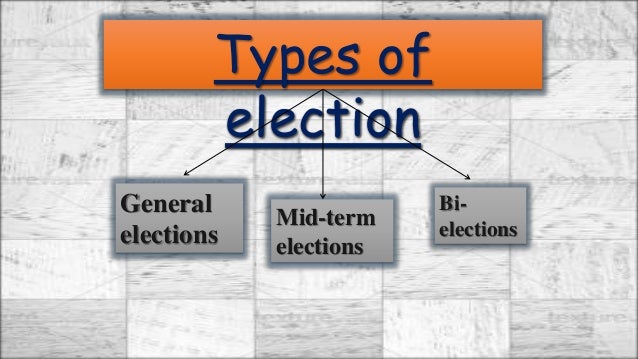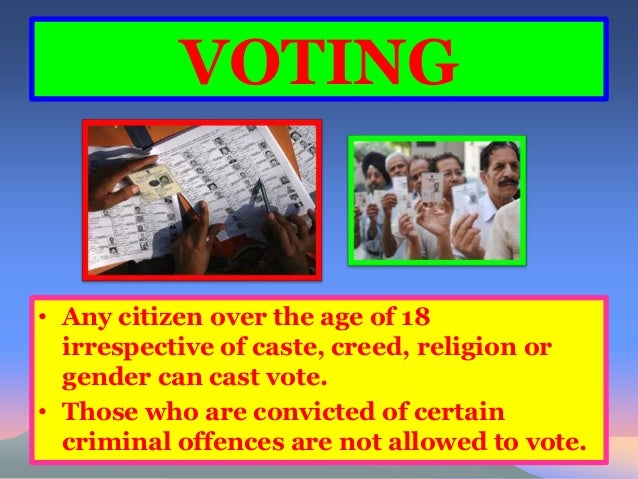ELECTION COMMISSION

India is a representative democracy which has opted for a Parliamentary
Form of Government. Under this system people elect their representatives
both for the state legislatures as well as for Parliament through
exercising their right to vote during periodic elections. Thus the
success of democracy depends on successful election mechanism. For a
healthy and functioning democracy it is essential that there is an
independent institution to conduct and supervise the election procedure.
Realizing this importance, the Constitution has provided for an
independent Election Commission.
Composition of the Election Commission:
Art 324 provides for a Chief Election Commissioner to be
appointed by the President He can also appoint any number of Election
Commissioners. Since 1993, the Election Commission consists of a Chief
Election Commissioner and two Election Commissioners. If the Election
Commission is a multi-member body then the Chief Election Commissioner
acts as the Chairman of the Election Commission. The decisions are
arrived at by either consensus or majority in a multi-member Election
Commission. There is a provision to appoint Regional Commissioners
before each general election to Lok Sabha and State Assembly and before
the general election and thereafter before each biennial election to the
Legislative Council. The President appoints them in consultation with
the Election Commission.
Removal of the CEC and Election Commissioners:
The CEC can be removed only on the same grounds and in the same manner
as a judge of the Supreme Court. An Election Commissioner or a Regional
Commissioner can be removed by the President only on the recommendation
of the Chief Election Commissioner.
Functions of the Election Commission:
 The
Election Commission superintends, directs and controls the elections to
Parliament, State Legislatures and Union Territories, Presidential and
Vice-Presidential elections. In this regard, it performs the following
functions:
The
Election Commission superintends, directs and controls the elections to
Parliament, State Legislatures and Union Territories, Presidential and
Vice-Presidential elections. In this regard, it performs the following
functions:
(a) Preparation of electoral rolls.
(b) Conduct of elections.
(c) Counting of votes and declaration of results.
(d) To
advise the President in regard to the questionwhether a Member of
Parliament (Art. 103) or a State Legislature has become subject to any
disqualification (Art. 192).
(e) To advice the President in the appointment ofRegional Commissioner.
The Constitution contains a bare outline of the law of election and the
powers and functions of the Election Commission. The detailed provisions
are contained in the following Acts:
The Presidential and Vice-Presidential Election Act, 1950.
The Representation of People Act, 1950.
The Representation of People Act, 1951.
The Delimitation Act, 1972.
Secular basis for electoral rolls (Art. 326):
The provisions discussed below are of general applications and apply to
elections to the Parliament and the state legislatures.For every
territorial constituency there will be one general electoral roll. No
person shall be ineligible for inclusion in the electoral roll on
grounds of religion, race, caste, sex or any of them.
Adult suffrage (Art. 326):
Any person who is a citizen of India and who is 18 years of age (61st
Amendment Act, 1988) is eligible to vote in Lok Sabha and State Assembly
elections unless he is disqualified by a law. The common
disqualification are based on unsoundness of mind, conviction for crime,
corrupt practice, at an election etc. They are contained in the
Representation of People Act
Election disputes (Art. 329):
Article 329 bars the interference of Courts in electoral matters. If a
Delimitation Commission draws the boundaries of a territorial
constituency it cannot be challenged in any Court of law.Article 329
also provides that no election to either House of Parliament or to a
House of a State Legislature shall be called in question except by an
election appropriate law. Since 1966, a High Court alone has the
jurisdiction to hear an election petition. Appeal lies with the Supreme
Court.




Post a Comment
Post a Comment